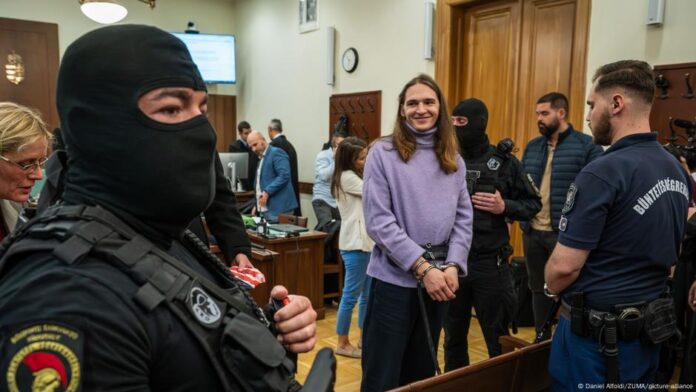Maja T. entered the courtroom in Budapest’s District 5 on October 8, 2025 in a prisoner transport belt and handcuffs, accompanied by helmeted police officers. One of the officers closed the window to block out the chants of “Free Maja!” that rose from a cluster of demonstrators.
Just another day in the trial of the suspected left-wing extremist, who is accused of having attacked and seriously injured several suspected right-wing extremists in Budapest in February 2023.
According to Germany’s Constitutional Court, this trial should not be taking place in Hungary. The German court in Karlsruhe ruled that insufficient checks were made before Maja T., a German national, was extradited to ensure that the conditions of detention in Hungary would be humane — especially in view of the fact that Maja T. is non-binary.
Legal expert Petra Bard, of the Central European University (CEU) in Budapest, says the Constitutional Court’s ruling also indicates doubt as to whether Maja T. can expect a fair trial. “It’s an open question, both because of their gender identity, and because of the way the case has been politicized.”
‘Fears the worst’
As a result, Maja T.’s family and friends are extremely worried. Their father, Wolfram Jarosch, told DW that he “fears the worst” in terms of how fair the trial will be — especially now, as the Hungarian prime minister, Viktor Orban, recently declared the anti-fascist movement Antifa a terrorist organization. From a purely legal standpoint, this has no bearing on the trial already underway. Jarosch, however, is convinced: “You can see that he’s exerting pressure, that Maja will ultimately be given a really draconian punishment.”
The background: In February 2023, a group of left-wing extremists, known as autonomists, ambushed a group of suspected neo-Nazis in Budapest and attacked them with metal bars and hammers, injuring some severely. Several people were arrested in both Hungary and Germany on suspicion of involvement in the attack, and some of the cases against them, in both countries, are still ongoing.
A verdict isn’t expected in Maja T.’s trial until January. Until then, they remain in pre-trial detention, where, according to their father, they are forced to endure isolation and degrading treatment. Applications for Maja to be transferred to house arrest have so far been denied.
Same charge, different circumstances
If convicted in Hungary, Maja T. faces a long prison sentence. By contrast, Ilaria Salis, a member of the European Parliament who is also accused of involvement in the crime, will not face any legal consequences, at least for now. On October 7, the European Parliament rejected the Hungarian prosecutors’ demand that it should lift the left-wing Italian politician’s immunity.
The result follows the recommendation of the Parliamentary Legal Affairs Committee. It found, among other things, concrete evidence that proceedings in Hungary were motivated by the intention to harm Salis’ political activities and therefore opposed the waiver of immunity.
Political statement on a legal basis
The vote was extremely close, with 306 votes to 305, not least because it is debatable whether immunity also applies to acts committed before taking office, lawyer Julia Pöcze, from the Brussels-based think tank Centre for European Policy Studies (CEPS), told DW.
The European People’s Party, which is the largest faction in the European Parliament, had publicly opposed maintaining Salis’ immunity — unlike in the cases of Peter Magyar and Klara Dobrev. The two Hungarian opposition figures are also facing charges in their home country.
Salis, a self-professed anti-fascist, was arrested in Hungary in February 2023 on charges of grievous bodily harm. While in Hungarian custody, she ran for the Italian Alliance of Greens and Left (Alleanza Verdi e Sinistra) in the 2024 European elections and was elected to the European Parliament in June of that year. The immunity she gained as a result led to her release shortly after her election.
Protection from repression or evasion of responsibility?
According to Pöcze, the European parliament’s vote in favor of her immunity is legally justifiable, even if it is a political statement: “I think it is a political message to the effect that they do not want to assist Viktor Orban. Lifting immunity would not have been a good precedent, but it is, of course, justified on technical grounds.”
Salis’ lawyer György Magyar, told DW the vote is a “victory for justice” and that “her immunity was not lifted because they don’t want her to be subjected to repression because of her views.” His client is not trying to evade responsibility for her actions, he said: “She does not deny having been involved in certain acts of violence. Immunity is not a way for her to escape.” Salis herself wants her trial in Italy to continue.
Terrorism allegations from Budapest
Budapest reacted with outrage to the votes in Strasbourg. On X, Orban wrote that Salis was “a member of a terrorist group” and was “protected” by Brussels, before adding: “The Brusselian bureaucrats like to lecture, but the pieces of their rule-of-law puzzle just don’t fit.” For him and his government, there are no problems with the Hungarian rule of law – though the EU does not always agree.
In 2018, Brussels initiated proceedings against Hungary under Article 7 of the EU Treaties, which could theoretically result in the suspension of voting rights. But nothing has happened for years, and the upcoming hearing scheduled for 21 October 2025 is not expected to bring any change.
“If there is one case where the application of sanctions under Article 7 would be justified, it is Hungary. But we haven’t even come close to that,” added Pöcze of CEPS. “Experience shows that it leads to nothing but further hearings.”
This article has been translated from German.
Source link






